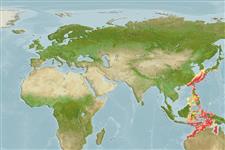Teleostei (teleosts) >
Perciformes/Uranoscopoidei (Sand dwellers) >
Ammodytidae (Sand lances)
Etymology: Bleekeria: He researched the fishes from India and Malaysia, 1862-1878 (Ref. 45335); mitsukurii: Although not specified in the original description, the specific epithet "mitsukurii" is honouring Kakichi Mitsukuri (1857-1909) zoologist and professor at the Imperial University of Tokyo.
Eponymy: Dr Pieter Bleeker (1819–1878) was an ichthyologist and army surgeon commissioned (1841) by the Dutch East India Company. [...] Dr Kakichi Mitsukuri (1857–1909) was a Japanese zoologist who first went to the USA (1873) and achieved doctorates from Yale (1879) and from Johns Hopkins University (1883). [...] (Ref. 128868), visit book page.
More on authors: Jordan & Evermann.
Environment: milieu / climate zone / depth range / distribution range
Ecology
Marine; benthopelagic; depth range 56 - 217 m (Ref. 86942). Tropical; 36°N - 21°S, 116°E - 140°E (Ref. 57360)
Indo-Pacific: central Japan to the South China Sea. Recorded from Indonesia and northwestern Australia (Ref. 5978) and from the Chesterfield Islands (Ref. 11897); also occurs in the western Indian Ocean (Ref. 7068).
Size / Weight / Age
Maturity: Lm ? range ? - ? cm
Max length : 16.0 cm TL male/unsexed; (Ref. 637)
Dorsal soft rays (total): 37 - 42; Anal soft rays: 14 - 16; Vertebrae: 50 - 56. This species is distinguished by having teeth in jaws; scales on central part of body of equal length and height; when fresh caudal fin colouration dusky with black-edged yellow inner margin (Ref. 123825).
Schools in shallow waters on sandy bottom, diving into the sand when threatened (Ref. 637). Probably taken by trawl net and handnet (Ref. 123825).
Life cycle and mating behavior
Maturity | Reproduction | Spawning | Eggs | Fecundity | Larvae
Collette, B.B., 2001. Ammodytidae. Sandlances. p. 3518. In K.E. Carpenter and V. Niem (eds.) FAO species identification guide for fishery purposes. The living marine resources of the Western Central Pacific. Vol. 6. Bony fishes part 4 (Labridae to Latimeriidae), estuarine crocodiles. FAO, Rome. (Ref. 10275)
IUCN Red List Status (Ref. 130435: Version 2024-1)
Threat to humans
Harmless
Human uses
Fisheries: bycatch
Tools
Special reports
Download XML
Internet sources
Estimates based on models
Preferred temperature (Ref.
123201): 18.4 - 27.6, mean 24.4 °C (based on 190 cells).
Phylogenetic diversity index (Ref.
82804): PD
50 = 0.5156 [Uniqueness, from 0.5 = low to 2.0 = high].
Bayesian length-weight: a=0.00324 (0.00140 - 0.00746), b=3.07 (2.88 - 3.26), in cm total length, based on LWR estimates for this (Sub)family-body shape (Ref.
93245).
Trophic level (Ref.
69278): 3.2 ±0.4 se; based on size and trophs of closest relatives
Resilience (Ref.
120179): High, minimum population doubling time less than 15 months (Preliminary K or Fecundity.).
Fishing Vulnerability (Ref.
59153): Low vulnerability (10 of 100).
